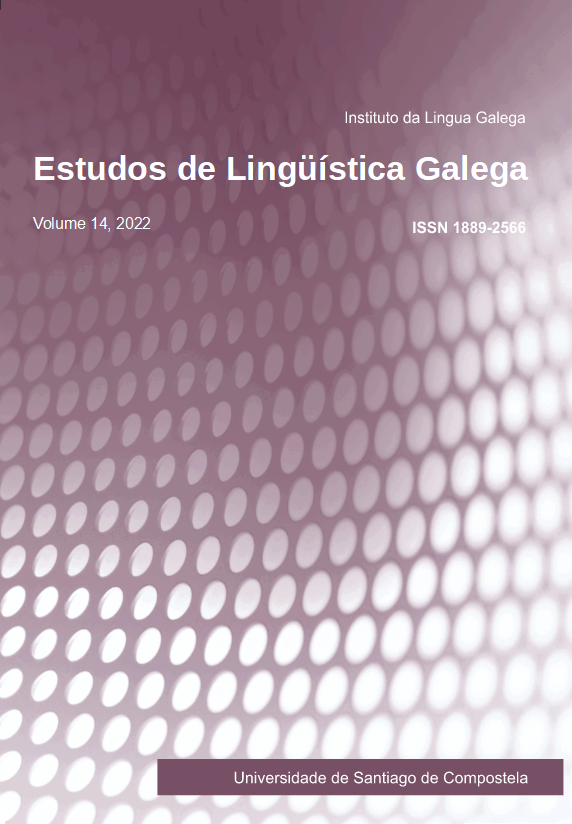Grammaticalisation of conditional constructions in Portuguese: courses of change regarding the noun caso
Main Article Content
Abstract
The purpose of this paper is to research the historical change processes leading to conditional constructions with caso in the history of Portuguese. Taking into account the theoretical frame of grammaticalisation (Heine & Kuteva 2007; Bybee 2010, 2015), together with translinguistic trends in the emergence of conditionals (Traugott 1985; Kortmann 1997), the aim is to find diachronic support to provide answers to the when and how for these changes. This analysis is based on data extracted from a longitudinal sample comprising texts from various genres, written between the 14th and 20th century. The research centres on the analysis of properties of the source nominal item which have enabled the development of different functional patterns of caso, in the domain of conditional junction. The argument presented herein is that the noun caso belongs to a particular subset of generic and unspecific “shell nouns” (Schmid 2000) whose semantic-cognitive and textual properties explain its choice for conditional expression in different patterns. The research results obtained by joining qualitative and quantitative approaches provide a set of evidence about change-conditioning contexts, about likely derivation relationships among the patterns of caso and about the gradience in the constitution of forms and meanings.
Keywords:
Article Details
References
Alexe, Raluca. 2013. Classification of complex conditional connectives in Romanian. Bulletin of the Transilvania University of Brasov vol. 6, 55, n. 2, 35-40. Séries IV: Philology and Cultural Studies.
Ali, Manuel Said. 1931. Grammatica histórica da língua portuguesa. São Paulo: Melhoramentos.
Barra Jover, Mario. 2002. Propiedades léxicas y evolución sintáctica. El desarrollo de los mecanismos de subordinación en español. Noia (A Coruña): Toxosoutos.
Barreto, Terezinha Melo. 1999. Gramaticalização das conjunções na história do português. Universidade Federal da Bahia. (Tese de doutoramento).
Blühdorn, Hardarik. 2008. Subordination and coordination in syntax, semantics and discourse: evidence from the study of connectives. Em Cathrine Fabricius-Hansen & Wiebke Ramm (eds.), Subordination versus Coordination in Sentence and Text. 59-85. Amsterdam: Benjamins. https:// doi.org/10.1075/slcs.98.04blu
Brinton, Lauren. 2007. Rise of the adverbial conjunctions (any, each, every) time. Em Ursula Lenker & Anneli Meurman-Solin (eds.), Connectives in the history of English. 77-96. Amsterdam: John Benjamins. https://doi.org/10.1075/cilt.283.06bri
Bybee, Joan. 2010. Language, usage and cognition. Cambridge: Cambridge University Press. https:// doi.org/10.1017/CBO9780511750526
Bybee, Joan. 2015. Language change. Cambridge: Cambridge University Press. https://doi. org/10.1017/CBO9781139096768
Camacho, Roberto Gomes. 2014. Construções relativas nas variedades do português: uma interpretação discursivo-funcional. Filologia e Linguística Portuguesa, 15, 179-214. https://doi.org/10.11606/ issn.2176-9419.v15i1p179-214
Câmara, Joaquim Mattoso. 1979. História e estrutura da língua portuguesa. Rio de Janeiro: Padrão Editora.
Dancygier, Barbara. 2003. Conditionals and prediction: time, knowledge, and causation in conditional constructions. Cambridge: Cambridge University Press. https://doi.org/10.1017/CBO9780511486463.008
Ernout, Alfred & Antoine Meillet. 1951. Dictionnaire etymologique de la langue latine: histoires des mots. Paris: Librairie Klincksieck.
Gerards, David Paul & Johannes Kabatek. 2018. Grammaticalization, distance, immediacy and discourse traditions: the case of portuguese caso. Em Salvador Pons Bordería & Óscar Loureda Lamas (eds.), Beyond Grammaticalization and Discourse Markers. 115-159. Leiden/Boston: Brill. https://doi.org/10.1163/9789004375420_006
Granvik, Anton. 2015. Oraciones completivas de sustantivo: un análisis contrastivo entre portugués y español. Verba 42, 347-401. https://doi.org/10.15304/verba.42.1856
Granvik, Anton. 2018. The development of the conditional caso construction in Spanish. Em Evie Coussé / Peter Andersson & Joel Olofsson (eds.), Grammaticalization meets construction grammar. 205-239. Amsterdam / Philadelphia: John Benjamins. https://doi.org/10.1075/cal.21.c8
Heine, Bernd & Tania Kuteva. 2007. The genesis of grammar: a reconstruction. New York: Oxford University Press.
Hengeveld, Kees & John Lachlan Mackenzie. 2008. Functional discourse grammar: a typologically based theory of language structure. Oxford: Oxford University Press. http://dx.doi.org/10.14198/ ELUA2009.23.18
Herman, József. 1963. La formation du système roman des conjonctions de subordination. Berlin: Akademie-Verlag.
Kortmann, Bernd & Ekkehard König. 1992. Categorial reanalysis: the case of deverbal prepositions. Linguistics 30, 671-697. https://doi.org/10.1515/ling.1992.30.4.671
Kortmann, Bernd. 1997. Adverbial subordination: a typology and history of adverbial subordinators based on European languages. Berlin / New York: Mouton de Gruyter. https://doi. org/10.1515/9783110812428
Leão, Ângela Vaz. 1961. O período hipotético iniciado por ‘se’. Belo Horizonte: Editora da Universidade Federal de Minas Gerais. Maurer, Theodoro Henrique. 1959. Gramática do latim vulgar. Rio de Janeiro: Acadêmica Editora.
Meillet, Antoine. 1912. Linguistique historique et linguistique générale. Paris: Libraire Honoré Champion. https://doi.org/10.1017/s0009840x00015493
Mithun, Marianne. 1988. The grammaticization of coordination. Em John Haiman & Sandra Thompson (eds.), Clause combining in grammar and discourse. 331-359. Amsterdam / Philadelphia: John Benjamins Publishing Company. https://doi.org/10.1017/s0022226700014778
Montolío, Estrella. 2000. On affirmative and negative complex conditional connectives. Em Elizabeth Couper-Kuhlen / Bernd Kortmann (eds.), Cause, condition, concession, contrast: cognitive and discourse perspectives. 143-171. Berlin: Mouton de Gruyter.
Raible, Wolfgang. 2001. Linking Clauses. Em Martin Haspelmath / Ekkehard Konig / Wulf Öesterreicher & Wolfgang Raible (eds.), Language Typology and Language Universals – an International Handbook. 590-617. Berlin / New York: De Gruyter.
Schmid, Hans-Jörg. 2000. English Abstract Nouns as Conceptual Shells: From Corpus to Cognition. Berlin / New York: Mouton de Gruyter. https://doi.org/10.1515/9783110808704
Schmid, Hans-Jörg. 2007. “Non-compositionality and Emergent Meaning of Lexico-grammatical Chunks”: a corpus study of noun phrases with sentencial complements as constructions. Zeitschrift für Anglistik und Amerikamistik 55.3, 313-340. https://doi.org/10.1515/zaa.2007.55.3.313
Sweetser, Eve. 1990. From etymology to pragmatics. Cambridge: Cambridge University Press.
Traugott, Elizabeth Closs. 1985. Conditional markers. Em John Haiman (ed.), Iconicity in sintax. 289-304. Amsterdam/Philadelphia: John Benjamins Publishing Company.
Traugott, Elizabeth Closs. 1995. Subjectification in grammaticalization. Em Dieter Stein & Susan Wright (eds.), Subjectivity and subjectivisation: linguistic perspectives. 31-54. Cambridge: Cambridge University Press. https://doi.org/10.1017/cbo9780511554469.003
Trudgill, Peter. 1995. Grammaticalisation and social structure: non-standard conjunction-formation in East Anglian English. Em Robert Frank Palmer (ed.), Grammar and meaning. 136-147. Cambridge: Cambridge University Press. https://doi.org/10.1017/cbo9780511620638.008
Visconti, Jacqueline. 2000. I connettivi condizionali complessi in italiano e in inglese: uno studio contrastivo. Alessandria: Edizioni Dell’Orso.







